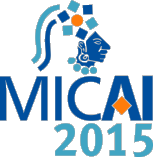|
|
Announcements
| 19 Oct | Schedule with specific papers announced. Minor changes are still possible. | |||
| 14 Oct | Detailed schedule overview announced | |||
14th
Mexican International Conference on Artificial Intelligence
October 25 to 31, 2015, Cuernavaca (near Mexico City), Mexico
Springer LNAI
(tentative);
CPS
(tentative); journals;
special issues of ISI JCR journals (anticipated).
Keynote speakers:
Alexander Gelbukh,
Paolo Rosso,
Juan-Manuel Torres Moreno,
Zita Vale,
Ruslan
Salakhutdinov,
more to be announced.
Tours to unique attractions:
Teotihuacan pyramids,
Cacahuamilpa cave,
Xochicalco archeological site.
Acceptance rate (oral session - LNAI volume) target around 25% -
See information about student grants
Collocated: Workshops / Call for Workshops,
Tutorials /
Call for Tutorials,
Call for Doctoral Consortium
  |
 |
 |
 |
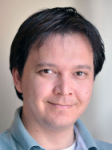 |
 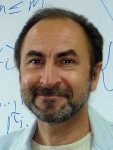 |
|||||
|
Alexander Gelbukh IPN |
Paolo
Rosso U.P. València |
J. Torres
Moreno U. d'Avignon |
Zita Vale Polit. do Porto |
R. Salakhutdinov U. of Toronto |
Gennady Osipov HSE |
Please distribute the CFP: long or short version - poster: DOC, PDF
MICAI was
characterized by Springer as premier conference in Artificial
Intelligence. It is a
high-level peer-reviewed international conference covering all areas of
Artificial
Intelligence, traditionally held in
All previous editions of MICAI were published in Springer LNAI, and the Special Sessions of most of the past MICAI events have been published by the CPS; At past MICAI events, extended versions of a considerable number of the LNAI papers were invited to special issues of journals, including ISI JCR-indexed journals; see for example a special issue on MICAI of Expert Systems with Applications. Recent MICAI events received over 300–400 submissions from over 40 countries each, with acceptance rate around 25% for the main session.
Publication: Papers accepted for long oral presentation will be published by Springer in a volume of the series Lecture Notes in Artificial Intelligence (LNAI). Special Session papers (or main session papers of which the authors choose this) will be published post-conference by CPS and a number of prestigious journals. Best papers awards will be granted to the 1st, 2nd and 3rd places. Special issues of journals are anticipated for best papers. Extended versions of selected papers are expected to be invited to special issues of journals, including ISI JCR-indexed journals. Traditionally at MICAI, the results of the SMIA Best Thesis in Artificial Intelligence Contest are announced.
|
June 23 |
Expression of interest: registration of draft abstracts |
|
|
June 30 |
Uploading of full text for registered papers |
|
|
July 25 |
|
Notification |
|
September 7 |
|
Camera-ready and payment deadlines for LNAI papers only |
|
To be announced |
Camera-ready deadline for poster papers |
|
|
October 25 |
Pre-conference events (registration, meetings) |
|
|
October 26, 27 |
Pre-conference events (workshops, tutorials) |
|
|
October 28–30 |
Main conference (keynote and regular talks, cultural program) |
|
|
October 31 |
Post-conference events (meetings, cultural program) |
|
The following tours are anticipated:
All buses for cultural program will depart from, and arrive to, the official hotel of the conference. |
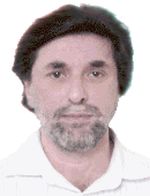  |
Alexander Gelbukh,
Instituto Politécnico Nacional, Mexico Research area: sentiment analysis, opinion mining, natural language processing. Keynote talk: Sentiment analysis and text similarity measures. Bio: Prof. Gelbukh holds MSc in mathematics by the Lomonosov Moscow State University, Russia, and PhD in computer science by the All-Russian Institute for Scientific and Technical Information. He is Research Professor and Head of the Natural Language Processing Laboratory of the Center for Computing Research of the Instituto Politécnico Nacional, Mexico, and invited professor of the National University of Colombia; he has been invited researcher at Waseda University, Japan, and distinguished visiting professor at Chung-Ang University, Korea. He is member of the Mexican Academy of Sciences and past President of the Mexican Association of Natural Language Processing. He is author of more than 500 journal and conference papers; co-author of 4 books; editor-in-chief or member of editorial board for a more than 10 international journals, and editor of more than 70 books and journal issues. He is the founder and Chair of the CICLing series of conferences on computational linguistics and natural language processing. He has been chair, honorary chair, or program committee chair of more than 30 international conferences, and (co-)advisor of more than 20 PhD students. |
|
 |
Paolo
Rosso, Universitat Politècnica de València, Spain Research area: plagiarism detection, irony detection and author profiling in social media. Keynote talk: The hard life of an opinion mining tool: dealing with deceptive opinions and irony. Abstract: With the increasing of social media, consumers rely more than ever on online reviews to make their decisions. A recent survey found that 87% of them have reinforced their decisions to purchase a product due to positive online reviews. At the same time 80% of consumers have changed their minds on the basis of negative information they found online. Therefore, online opinions play an important role for companies and there is an increasing trend to post fake reviews with the aim to sound authentic and deceive the consumers. The detection of deceptive opinions is a quite challenging problem and not only automatically (only 60% of humans discriminate between truthful and deceptive opinions with a certain degree of accuracy). In the first part of the talk I will give an overview of the state-of-thye-art approaches for detecting deceptive opinions. The second part of the talk is devoted to another issue that makes the life of a sentiment analysis tool quite difficult: detecting irony. In ironic opinions what is literally said is usually negated, and in absence of an explicit negation marker. This makes sentiment analysis quite challenging. Therefore, there is a growing interest from the research community in investigating the impact of irony on sentiment analysis and a task has been organized recently at SemEval in 2015 on sentiment analysis of figurative language in Twitter. In the talk I will describe how irony is employed in tweets and reviews and what are the recent state-of-the-art attempts for its automatic detection. Linguistic devices such as ambiguity, incongruity, unexpectedness and emotional contexts play an important role as triggers of irony. At the end I will also address the even more challenging fine-grained problem of discriminating between irony and sarcasm: e.g. If you find it hard to laugh at yourself, I would be happy to do it for you. Bio: Paolo Rosso is an associate professor of computer science at the Universitat Politècnica of València and is a member of the Pattern Recognition and Human Language Technology (PRHLT) research centre. His research interests include author profiling and irony detection in social media, opinion spam detection, as well as text reuse and plagiarism detection. Since 2009 he has been involved in the organization of PAN benchmark activities, since 2010 and 2011 in the framework of CLEF and FIRE evaluation forums, on plagiarism / text reuse detection and author profiling. He has been also co-organiser of the shared tasks on Sentiment polarity classification at Evalita and on Sentiment analysis of figurative language in Twitter at SemEval-2015. The shared tasks have been organized in the framework of the EC project on Web information quality evaluation initiative (WIQ-EI). He has been involved in several national and international research projects (seven as PI). At the moment he is PI of the SOCOCODE project on Social copying community detection, funded by the US Army Research Office (ARO), and whose aim is to detect copying in social media. He is the deputy steering committee chair for the CLEF conference, and co-author of 30+ articles in international journals and 350+ articles in conferences and workshops. He has been organization chair of CERI-2012, organization co-chair of CLEF-2013, program co-chair of *SEM-2015, and he has organized several workshops at IBERAMIA, LREC, CIKM, SEPLN, AIIA and AAMAS. He has been advisor of 10 PhD students and at the moment he is (co)advisor of 10. |
|
 |
Juan Manuel Torres
Moreno, Université d'Avignon et des Pays de Vaucluse,
France Research area: artificial neural networks, automatic text summarization, written natural language processing. Keynote talk: Automatic Text
Summarization: What have we succeeded and what we need to do? Bio: Prof. Torres Moreno was born in Veracruz, Mexico. He works in Avignon, France. In the past, he worked for the Ecole Polytechnique de Montreal, Canada, and Université du Québec. He holds a PhD in Neural Networks by the Center of Nuclear Studies of Grenoble, France, an MSc degree by the INPG of Grenoble, and a BSc degree as Engineer in Electronics from the UAM-Azcapotzalco. He has written a collection of Nouvelles de la cité. Another of his likings is philately, as well as painting (the engravings of Escher), music, and good science fiction movies. |
|
 |
Zita Vale, Politécnico do Porto Keynote talk: Field and Market Data Mining for Smart Grid Operation (to be confirmed) Tutorial: Data Mining Bio: Zita Vale
works in the area of Power Systems, with special interest in network
planning and operation. She has been working in the application of
Artificial Intelligence techniques to Power Systems since 1988. |
|
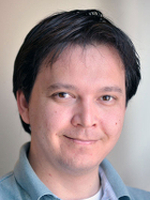 |
Ruslan Salakhutdinov, University of Toronto. Research area: Deep Learning, Probabilistic Graphical Models, and Large-scale Optimization. Keynote talk: Recent Advances in Deep Learning. (The talk will be delivered via videoconference.) Abstract: Building intelligent systems that are capable of extracting meaningful representations from high-dimensional data lies at the core of solving many Artificial Intelligence tasks, including visual object recognition, information retrieval, speech perception, and language understanding. In this talk I will first introduce various deep learning models and show that they can learn useful hierarchical representations from large volumes of high-dimensional data with applications in information retrieval, object recognition, and speech perception. I will also discuss deep models that are capable of extracting a unified representation that fuses together multiple data modalities. I will show that on several tasks, including modelling images and text, video and sound, these models significantly improve upon many of the existing techniques. Bio: Ruslan Salakhutdinov is an assistant professor of Computer Science and Statistics at the University of Toronto; Microsoft Faculty Fellow, and Sloan Fellow. He works in the field of statistical machine learning. He received his PhD in computer science from the University of Toronto in 2009. After spending two post-doctoral years at MIT, he joined the University of Toronto in 2011. He is or has been Action Editor, Journal of Machine Learning Research (JMLR); Editorial Board member, Journal of Artificial Intelligence Research (JAIR); Area Chair, NIPS 2012, NIPS 2011, and ICML 2015, 2013,2012, 2011; Workshop Chair, UAI 2012; Demonstration Chair, NIPS 2013; Tutorial Chair, ICML 2014; Guest editor for IEEE Transactions on Pattern Analysis and Machine Intelligence (PAMI), Special Issue on Learning Deep Architectures, 2014. He has recently given over 70 invited talks at international conferences. |
|
 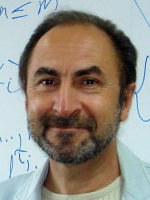 |
Gennady S. Osipov, National Research University Higher School of Economics; Federal Research Center for Computer Science and Control of the Russian Academy of Sciences, Russia. Keynote talk: Signs-based vs. Symbolic Models Gennady
Osipov, PhD, DSc is the deputy director of the Federal Research Center
for Computer Science and Control of the Russian Academy of Sciences
(RAS), professor of the Moscow Institute of Physics and Technology, of
the Bauman Moscow State Technical University and of the National
Research University Higher School of Economics. His areas of research
are intelligent dynamic systems, heterogeneous semantic networks,
relational-situational methods of text analysis and semantic search
engines. He is the President of the Russian Association for Artificial
Intelligence, the Fellow of the European Coordinating Committee for
Artificial Intelligence (ECCAI), the recipient of the Governmental
Grants for Outstanding Scholars from the President of Russian
Federation. He is the vice-editor in chief of the journal “Artificial
Intelligence and Decision Making” published by RAS. He is an author of
170 papers, 7 monographs, 2 manuals, and 4 patents. |
Topics of interest are all areas of Artificial Intelligence, including but not limited to:
|
|
The registration fee amount for authors is USD 520 or MXN 8000. This includes one paper only. If one author has more than one accepted paper, in order for the papers to be published the fee is to be paid for each of them independently, with a discount of USD 100 or MXN 1500, i.e., for the second etc. paper presented by the same author, an additional fee of USD 420 or MXN 6500 is to be paid.
This fee includes publication of one paper (up to the page limit) in any of the proceedings volumes or journal issues derived from the conference, one hard copy of a proceedings volume (where the corresponding paper was published; other volumes are not included), access to a digital copy of the pre-print versions of all accepted papers (unless copyright holders prevent us from distributing such copies), conference material, and attending the keynote lectures, regular technical presentations, and the poster session.
Additional fee applies for papers that exceed the page limit (USD 10 per additional page, in either review or camera-ready version, whichever is greater), for purchasing additional copies of the proceedings (USD 75), for participating in some of the cultural activities, and for accompanying persons to participate in some of the cultural activities.
Registration fee for non-author attendees (main conference, tutorials, and workshops) and workshop authors will be lower. It will be announced later.
|
A very limited number of student grants for full-time students from developing countries (Mexico included) will be given to applicants in thoroughly justified cases and only to the applicants that will attend the conference in person. Strong preference will be given to the authors of the papers that received excellent evaluation scores and of which the applicant is the main author.
We solicit original research papers written in English. The submissions must not have been previously published or be under review for another conference or journal. Only complete and finished papers will be reviewed, not abstracts. After your paper is accepted you will have a chance to improve it according the comments of the reviewers, but the reviewers will assume that the text that they are reading is the text that is to be published, with the only changes they explicitly request (as opposed to reviewing a draft or abstract). In particular, the papers must be submitted in the required format. We reserve the right to reject without review the submissions that do not follow the format guidelines.
Submission procedure. Submissions are received electronically. The submission and reviewing procedure is handled the the EasyChair system. To submit a paper:
If you have not a user of the EasyChair system, you will need to register using the "I have no EasyChair account" button. Please do not send us your submissions by email. Please contact us in case of problems.
Submission is done in two phases. First, by the expression of interest deadline, we only need the tentative title and a draft abstract of your paper (you can change this later); they will be used only to reserve the appropriate reviewers for your paper - why not doing it right now? Later, by the full paper submission deadline, we will need the full text of your paper, as a PDF file. Both the draft abstract and full paper are uploaded via the EasyChair system. If you read this late, or need more time, you can upload your paper while the system is open, or contact us for late submissions.
Submission of the paper assumes that at least one author will register at the conference and present an accepted paper or poster. Full registration fee should be paid for each accepted paper.
Size. Registration fee for authors includes publication of a paper of up to 12 pages, though more pages can be used for a small additional fee. We strongly encourage authors to use as many pages as really necessary for an excellent paper: longer papers have better impact and receive more citations. Do not sacrifice the quality of your paper to squeeze it into the page limit.
For each page that exceeds this limit small extra fee of USD 10 will be charged. If your page exceeds 20 pages, please contact the organizers first. The additional fee is charged for the pages exceeding the page limit in either the version submitted for review or in the camera-ready version, whichever is greater. In particular, you must not shorten the camera-ready version in comparison with the version submitted for review unless the reviewers required this (contact us if you feel you should do shorten it; in any case this would not reduce the fee). However, we encourage you to use as many pages as you really need for an excellent paper, even if you will pay a very small fee for it -- that it, we recommend you not to sacrifice clarity and completeness of your paper for the page limit.
Double blind review policy: the review procedure is double blind. Thus the papers submitted for review must not contain the authors' names, affiliations, or any information that may disclose the authors' identity (this information is to be restored in the camera-ready version upon acceptance). In particular, in the version submitted for review please avoid explicit auto-references, such as "in [1] we show" -- consider "in [1] it is shown". I.e., you may cite your own previous works provided that it is not deducible from the text that the cited work belongs to the authors. When citing your previous work, please keep the names:
Incorrect: In [1] we have shown ...
1. <Hidden for review>, Syntactic Structures, The Hague, Mouton, 1957.Correct:
In [1] it was shown ...
1. Chomsky, N., Syntactic Structures, The Hague, Mouton, 1957.
Format. The submissions are to be formatted in strict accordance with the Springer LNCS format guidelines. You can find here some useful advice on formatting.
Workshops, Tutorials, Doctoral Consortium
Workshops and tutorials will be organized in conjunction with MICAI 2015; see Workshops / Call for Workshops, Tutorials / Call for Tutorials, Call for Doctoral Consortium.
MICAI 2015 will be held in the city of
Cuernavaca (near Mexico City), Mexico,
at the the
Instituto de Investigaciones Eléctricas.
The official
hotel of the conference is
Holiday Inn, located at Diaz Ordaz 86, Acapantzingo,
62440 Cuernavaca, Mor., Mexico, phone +52 777 362 0203 (not Holiday Inn
Express & Suites).
All local transportation, such as tour buses, will be organized to/from
this hotel.
Please book a room at this hotel. For discounted price, please indicate
that you come to MICAI 2015.
Transportation
from Mexico City Airport to the hotel: we recommend to ask at the airport
for a bus to the city of Cuernavaca (about 1 hour drive) and within Cuernavaca,
take taxi to the hotel.
Taxi in Mexico is cheap and safe enough.
|
NEW Schedule with specific papers announced. Minor changes are still possible. The general schedule of the conference will be as follows:
|
Conference chair: Grigori Sidorov
Program chairs:
Gustavo Arroyo
Figueroa (IIE), Sofia Natalia
Galicia Haro (UNAM),
Oscar Herrera Alcántara (UAM),
Obdulia Pichardo
Lagunas (IPN), Grigori Sidorov
(IPN).
Finance chair: Ildar Batyrshin. Publication chair:
Miguel Gonzalez Mendoza
Local organizing committee chairs:
Gustavo Arroyo
Figueroa (IIE; garroyoiie.org.mx),
Noé
Alejandro Castro Sánchez (CENIDET, noe.acastrogmail.com),
María Yasmín Hernández Pérez (IIE, myhpiie.org.mx),
Liliana Chanona Hernández (IPN).
Program Committee
| Abraham Sanchez Lopez Adel Alimi Albert Bifet Alberto Reyes Alberto Reyes Ballesteros Alejandro Rosales Alessandro Ricci Alexander Gelbukh Alexander Tulupyev Alexandra Balahur Alfredo Arias-Montaño Alfredo Gabaldon Aline Villavicencio Alisa Zhila Ana Gabriela Gallardo-Hernández Anastasios Bezerianos Anastasios Tefas Andrea Formisano Angel Kuri-Morales Anilu Franco-Arcega Antonio Hernandez Antonio-José Sánchez-Salmerón Aristidis Likas Arles Rodriguez Arturo Garcia-Perez Arturo Gonzalez Asif Ekbal Aurelio Lopez Bernadette Sharp Bernardete Ribeiro Bogdan Smolka Bruno Lara C. Alberto Ochoa-Zezatti Carlos Arturo Gracios-Marin Carlos Garcia-Capulin Carlos Mario Zapata Jaramillo Carlos Montoro Chaman Sabharwal Claude Frasson Claudia Zepeda Cortes Dario Landa-Silva David Claudio Gonzalez David Pinto Denis Filatov Diana Inkpen Dieter Hutter Dieter Mitsche Dunja Mladenic Eber Enrique Orozco Guillén Edgar Vallejo Eduardo Cabal-Yepez Eduardo Gomez-Ramirez Eduardo Rodriguez-Tello |
Efrén Mezura-Montes Efren Gorrostieta Efstathios Stamatatos Ekaterina Ovchinnikova Erik Cambria Erik Cuevas Erik Rodner Eugene Levner Fanhai Yang Felipe Orihuela-Espina Felix Calderon Felix Castro Espinoza Felix F. Gonzalez-Navarro Fernando Aldana Fevrier Valdez Francisco Martínez-Álvarez Francisco Viveros Jiménez Friedhelm Schwenker Gibran Etcheverry Gregorio Toscano Pulido Grigori Sidorov Guillem Alenya Guillermo De Ita Guillermo Morales-Luna Guillermo Sanchez-Diaz Gustavo Arroyo Gustavo Cerda-Villafana Héctor Jiménez Salazar Héctor Pérez-Urbina Heriberto Cuayahuitl Heydy Castillejos Hiram Calvo Horacio Rostro Gonzalez Hugo Jair Escalante Humberto Sossa Ildar Batyrshin Iria Da Cunha Ivan Mesa Ivan Olmos Ivan Razo Ivan Vladimir Meza Ruiz Ivandre Paraboni J. Raymundo Marcial-Romero Jaime Mora-Vargas Jesús Emeterio Navarro-Barrientos Jesus Angulo Joaquin Gutierrez Johan Suykens Jorge Solis José Alberto Hernández Aguilar Jose Arrazola Jose Luis Carballido Jose Ruiz-Pinales |
Jose Santos Josef Steinberger Juan Arturo Nolazco Flores Juan C. Acosta-Guadarrama Juan Carlos Nieves Juan Humberto Sossa Azuela Juan J. Flores Klempous Ryszard Konstantinos Koutroumbas Kostas Triantafyllopoulos Laetitia Jourdan Leonardo Trujillo Leszek Nowak Lourdes Martínez Luciano Sanchez Luis Enrique Sucar Luis Martí Ma. de Guadalupe Garcia-Hernandez Magdalena Ortiz Manuel Montes-Y-Gómez Manuel Vilares Ferro María Auxilio Medina Nieto Maria De Marsico Maria Lucia Barrón-Estrada Marianna Apidianaki Marino Sánchez Parra Mario Pavone Mark Hasegawa-Johnson Marta R. Costa-Jussà Masaki Murata Mathieu Lafourcade Mauricio Osorio Michael Carl Michael T.M. Emmerich Michele Nappi Miguel Gonzalez-Mendoza Mikhail Mikhailov Nicolas Younan Nicoletta Calzolari Niladri Chatterjee Noé Alejandro Castro-Sánchez Obdulia Pichardo Oleksiy Shulika Olga Kolesnikova Oliver Schuetze Omar López-Ortega Onofrio Gigliotta Orion Reyes Oscar Castillo Oscar Dalmau Oscar G. Ibarra-Manzano Oscar Herrera Pablo H. Ibarguengoytia |
Pablo Ibarguengoytia González Panagiotis Vlamos Paolo Rosso Partha Pakray Patricia Melin Patrick Siarry Pedro Flores Pinar Karagoz Piotr W. Fuglewicz Ponciano Jorge Escamilla-Ambrosio R. Carolina Medina-Ramirez Rafael Batres Ramon Zatarain Raul Monroy Raúl Garduño Ramírez Reyer Zwiggelaar Ricardo Landa Ricardo Martinez Risto Fermin Rangel Kuoppa Rocio Lizarraga-Morales Rodolfo Ibarra Rogelio Hasimoto Roger Nkambou Roxana Girju Sánchez López Abraham Sabino Miranda Salvador Ruiz Correa Sergio Ledesma Shahnaz Shahbazova Shiliang Sun Sivaji Bandyopadhyay Sofia N. Galicia-Haro Sonia Ordoñez Stefania Costantini Stefano A. Cerri Stephane Marchand-Maillet Tanja Magoc Ted Pedersen Teresa Alarcón Thamar Solorio Valia Kordoni Vania Dimitrova Vera Lúcia Strube De Lima Victor Ayala-Ramirez Victor Muñiz Virgilio Lopez-Morales Vlad Estivill-Castro Vladik Kreinovich Volodymyr Ponomaryov Yasmín Hernández Pérez Yasunari Harada Yoel Ledo Mezquita Yulia Ledeneva |
|
|
Download the famous |
